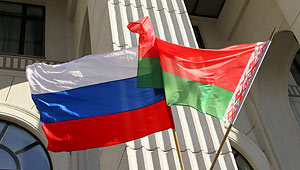Ru
|
Eng
Over $50m to finance Union State R&D programs in 2015
02.04.2015

Over $50 million will be allocated for financing scientific and technical programs of the Union State of Belarus and Russia in 2015, BelTA learned from Alexander Shumilin, Chairman of the State Science and Technology Committee of Belarus, at a press conference on 2 April.
According to the source, ten R&D programs of the Union State of Belarus and Russia were fulfilled in 2014, with their funding close to $100 million in accordance with exchange rates of the year 2014. Plans have been made to implement another nine programs in 2015, with over $53 million allocated for them.
The official said that two programs were completed in 2015 while another Union State program SKIF Nedra was launched. As part of this program developmental prototypes of SKIF Geo supercomputers will be created for the sake of handling the work involved in surveying and extracting mineral resources (geological and geodesic modelling). The supercomputers are supposed to be installed in the Geology Research Institute and the Belarusian potash manufacturer Belaruskali. As a result of the program the precision of predictions involved in drilling wells to extract hydrocarbon resources (for Russia) and potassium (for Belarus) will be increased. Since it takes up to $2 million to drill one prospecting borehole in order to find hydrocarbon resources, the lesser probability of errors will save a lot of money spent on minerals prospecting. The program will be financed by the Union State budget as well as non-budgetary resources of the executing agencies. SKIF Nedra will need RUB1.37 billion, including RUB750 million ($12.6 million) from the Union State budget.
Twenty concepts of new Union State programs are being developed. “In 2015 programs codenamed DNA Identification, Motor – Synthesis – Gas will be added. As far as DNA Identification is concerned, the program will represent a step towards personified healthcare. Medications will be developed depending on the genotype of the patient,” said Alexander Shumilin.
According to the source, ten R&D programs of the Union State of Belarus and Russia were fulfilled in 2014, with their funding close to $100 million in accordance with exchange rates of the year 2014. Plans have been made to implement another nine programs in 2015, with over $53 million allocated for them.
The official said that two programs were completed in 2015 while another Union State program SKIF Nedra was launched. As part of this program developmental prototypes of SKIF Geo supercomputers will be created for the sake of handling the work involved in surveying and extracting mineral resources (geological and geodesic modelling). The supercomputers are supposed to be installed in the Geology Research Institute and the Belarusian potash manufacturer Belaruskali. As a result of the program the precision of predictions involved in drilling wells to extract hydrocarbon resources (for Russia) and potassium (for Belarus) will be increased. Since it takes up to $2 million to drill one prospecting borehole in order to find hydrocarbon resources, the lesser probability of errors will save a lot of money spent on minerals prospecting. The program will be financed by the Union State budget as well as non-budgetary resources of the executing agencies. SKIF Nedra will need RUB1.37 billion, including RUB750 million ($12.6 million) from the Union State budget.
Twenty concepts of new Union State programs are being developed. “In 2015 programs codenamed DNA Identification, Motor – Synthesis – Gas will be added. As far as DNA Identification is concerned, the program will represent a step towards personified healthcare. Medications will be developed depending on the genotype of the patient,” said Alexander Shumilin.
SCIENCE. TECHNOLOGY. INNOVATIONS
13.08.2024
28.06.2024
28.06.2024
25.06.2024
05.06.2024
15.05.2024
15.05.2024
26.04.2024
26.04.2024
26.04.2024













